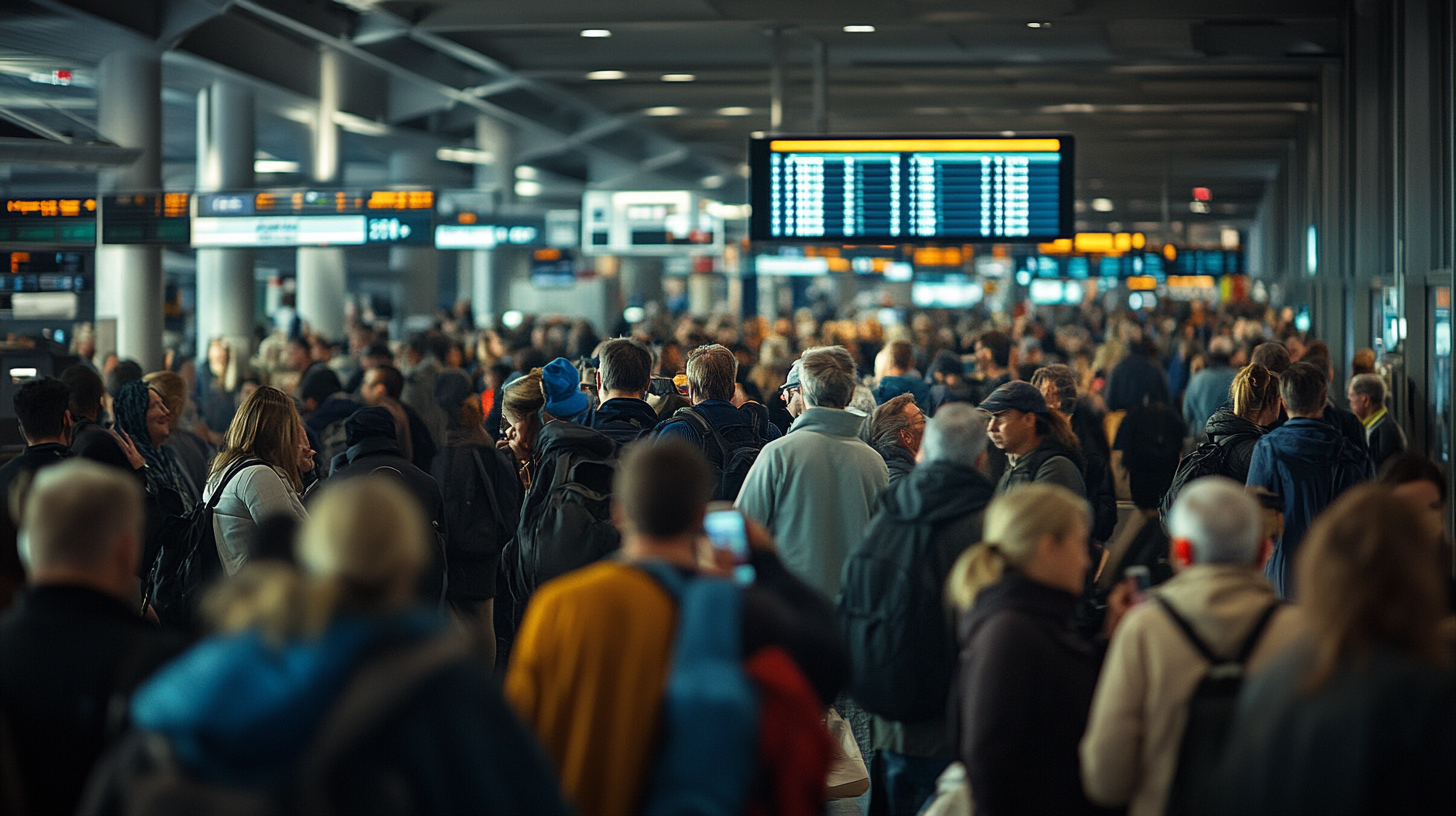Navigating Cancelled Flights: Tools, Updates, and Passenger Rights

Flight cancellations can turn a well-planned trip into a stressful and chaotic experience. Imagine arriving at the airport, luggage in hand, only to find that your flight has been canceled without prior notice. Such situations not only disrupt travel plans but can also lead to significant financial losses and emotional distress. Whether cancellations arise due to unforeseen weather conditions, such as sudden storms grounding planes, or operational issues like airline staffing shortages, understanding how to navigate these disruptions is essential for every traveler. This comprehensive guide delves into recent flight cancellations, effective tools to stay informed, and the rights passengers have when facing unexpected changes to their travel plans, as detailed in the Essential Passenger Rights During Flight Disruptions .
Understanding Flight Cancellations

Flight cancellations disrupt thousands of travelers daily, leading to missed connections, extended layovers, and completely altered itineraries. These disruptions can have a domino effect, not only affecting the initial flight but also subsequent travel plans, accommodations, and even important events or meetings. While some cancellations are unavoidable—such as those caused by severe weather phenomena like hurricanes, blizzards, or volcanic ash clouds—others stem from operational challenges within airlines, including mechanical failures, crew shortages, or scheduling conflicts. In some cases, air traffic control restrictions or security issues can also lead to flights being grounded. Staying informed and prepared can significantly mitigate the inconvenience caused by cancellations and help passengers make timely adjustments to their plans. For more insights, consider exploring the Guide to Understanding Flight Cancellation Causes and Effects .
Tools to Stay Informed About Flight Disruptions

The AirAdvisor Live Status Checker

One of the most effective ways to stay ahead of flight disruptions is by utilizing real-time monitoring tools that aggregate and present flight data in a user-friendly manner. The AirAdvisor Live Status Checker is a robust platform designed to provide up-to-date information on delayed and canceled flights, helping passengers navigate the often turbulent skies of air travel with confidence. By selecting from over 400 airlines, travelers can access a wealth of information tailored to their specific needs. The platform’s intuitive interface ensures that even less tech-savvy users can easily obtain crucial flight information when it matters most.
- Real-Time Flight Data: The tool harnesses a proprietary algorithm that continuously scans and updates flight statuses, ensuring that passengers receive the most current information available. This real-time data enables travelers to react promptly to any changes, such as gate alterations or departure times, reducing uncertainty and anxiety.
- Disrupted Flight Listings: Users can effortlessly view comprehensive lists of flights experiencing disruptions, categorized by airline or route. This feature allows for proactive planning, enabling passengers to explore alternative flights or make necessary arrangements ahead of time.
- Estimated Compensation Payouts: The platform offers insights into potential compensation amounts based on the nature and extent of the disruption. By understanding their entitlements, passengers can make informed decisions about pursuing claims and can better assess the impact of the cancellation on their finances.
- Compensation Claims: With a straightforward and user-friendly process, affected travelers can initiate a compensation claim directly through the tool. The platform guides users step-by-step, simplifying what can often be a complex and daunting procedure, and increasing the likelihood of a successful claim.
- Travel Planning Aid: By identifying routes and airlines frequently associated with disruptions, passengers can plan smarter, choosing itineraries that minimize the risk of cancellations or delays. This strategic planning tool helps travelers avoid common pitfalls and enhances the overall travel experience.
The AirAdvisor Live Status Checker empowers travelers to make informed decisions, reducing the stress associated with unexpected flight changes. By providing a centralized hub for critical flight information and compensation support, the tool transforms how passengers cope with disruptions, turning potential chaos into manageable situations. For additional real-time monitoring options, see Top Tools for Tracking Flight Status in Real Time .
Recent Flight Disruptions at Charleston International Airport

Flight disruptions are not uncommon, and recent events at Charleston International Airport serve as a stark reminder of the importance of staying updated. According to FlightAware reports, a significant number of flights were affected over a short period, causing widespread inconvenience to passengers:
- On Monday morning, there were 15 cancellations and 15 delays, primarily impacting American Airlines departures. This sudden spike in disruptions left many travelers scrambling to adjust their plans.
- On Sunday, the airport experienced an even more substantial impact, with 34 cancellations and 82 delays. These numbers reflect a considerable portion of the day’s scheduled flights, highlighting the scale of the issue.
While the exact impact of weather conditions on these disruptions remains unclear, such a significant number of affected flights underscores the precarious nature of air travel and the need for passengers to be proactive. In situations like these, timely information can make the difference between a manageable inconvenience and a travel nightmare. Passengers are urged to take the following steps to mitigate the impact of such disruptions:
- Check with Airlines: Travelers are advised to maintain open lines of communication with their respective airlines. By staying in direct contact, passengers can receive personalized updates, explore alternative routes or flights, and understand their options for rebooking or refunds.
- Monitor Flight Status: Regularly checking flight status through airline websites or reliable tools like the AirAdvisor Live Status Checker can provide timely information. Real-time updates enable travelers to react quickly to changes, reducing the likelihood of missed notifications or last-minute surprises.
These recent events at Charleston International Airport highlight the unpredictable nature of flight schedules and emphasize the importance of vigilance and preparedness in travel planning.
Airline Policies and Passenger Rights

The U.S. Department of Transportation’s New Dashboard

Navigating airline policies can be a daunting task for passengers, especially in the midst of travel disruptions. Policies often vary between airlines and can be filled with complex terms and conditions that are difficult to interpret. To assist passengers in understanding their rights and the commitments of airlines, the U.S. Department of Transportation (DOT) has launched a new dashboard. This innovative tool provides easy access to critical information about U.S. airlines’ services aimed at mitigating inconveniences caused by delays or cancellations within their control.
Key features of the DOT’s dashboard include:
- Service Commitments: The dashboard employs a simple visual system, using green check marks to indicate airlines that have committed to providing specific services during controllable cancellations or delays, and red “X”s for those that have not. This clear representation helps passengers quickly assess which airlines are more likely to offer assistance during disruptions.
- Amenities Comparison: Passengers can compare the amenities offered by different airlines during such events, such as meal vouchers, hotel accommodations, or ground transportation. This comparison aids travelers in making informed choices when booking flights, potentially selecting airlines that offer better support in case of disruptions.
- Accountability: By publicly displaying airlines’ commitments, the dashboard holds carriers accountable for adhering to their customer service plans during controllable events. Airlines that fail to meet their stated obligations may face potential accountability measures from the DOT, encouraging compliance and fostering improved customer service standards across the industry.
Importantly, passengers are entitled to refunds for any cancellation or significant change, regardless of the reason—even for non-refundable tickets. This right ensures that travelers are not financially penalized for disruptions beyond their control. If issues arise, and passengers believe their rights have been violated, they have the option to file complaints with the DOT. The department reviews these complaints and can take action against airlines that fail to comply with federal regulations.
The DOT’s dashboard empowers passengers by enhancing transparency and providing accessible information about their rights and airline obligations. Passengers seeking detailed information on airline commitments may refer to the Official U.S. DOT Airline Customer Service Dashboard .
Case Study: Delta’s Response to Winter Weather Cancellations

Airlines often implement specific policies to assist passengers during widespread disruptions caused by uncontrollable factors like severe weather. A recent example is Delta Air Lines’ proactive response to winter weather conditions that significantly affected travel in certain regions of the United States.
Winter Weather Impact on Atlanta and the Gulf Coast

In January, harsh winter storms brought snow and ice to parts of the South, regions that are unaccustomed to such weather extremes. This led to hazardous conditions impacting both ground and air transportation. Delta addressed the challenges posed by winter weather in:
- Atlanta: January 20-21, a major hub for Delta, where icy runways and reduced visibility necessitated flight cancellations and delays.
- The Gulf Coast: January 20-22, affecting airports across the region as winter storms disrupted operations.
The airline offered several options to assist affected customers, demonstrating a commitment to customer service and flexibility:
- No-Cost Rebooking: Passengers were allowed to rebook flights at no additional cost, providing the flexibility to adjust travel plans without incurring penalties or fees. This option helped alleviate the stress of rescheduling during an already challenging situation.
- Alternatives and Refunds: Customers dissatisfied with the changes or unable to find suitable alternatives had the option to seek other travel arrangements or request refunds for unused portions of their tickets. This policy ensured that passengers were not left bearing the financial burden of the disruptions.
- Baggage Handling: Delta committed to rerouting checked bags on new flights. In cases where bags were delayed or misdirected, passengers could report the issue and receive reimbursement for necessary expenses incurred as a result. This attentiveness to passengers’ belongings helped maintain trust and satisfaction.
- Expense Reimbursement: For significant delays, passengers might qualify for reimbursement of reasonable expenses, such as meals or hotel accommodations. This support acknowledged the inconvenience caused and provided tangible assistance to those stranded or delayed.
Delta encouraged customers to learn more about managing disruptions by visiting their website, where detailed information and assistance were readily available. By emphasizing transparency and support during challenging times, Delta aimed to enhance the customer experience even amidst unavoidable disruptions. Passengers can learn more about airline-specific policies in the Airlines’ Policies on Flight Disruptions and Cancellations .
This case study exemplifies how airlines can effectively respond to unexpected events, balancing operational necessities with a commitment to customer care. Policies like no-cost rebooking and expense reimbursements play a crucial role in helping passengers navigate the difficulties posed by flight cancellations.
Tips for Managing Flight Cancellations

In light of the complexities surrounding flight disruptions, passengers can take proactive steps to minimize inconvenience and navigate cancellations more effectively:
- Stay Informed: Regularly check your flight status through official airline channels or reliable tools like the AirAdvisor Live Status Checker. Staying updated allows you to react promptly to changes. Sign up for airline notifications via email or text message to receive real-time updates. Knowledge is power, and being informed provides a critical advantage in reorganizing your travel plans.
- Understand Your Rights: Familiarize yourself with airline customer service plans and the DOT’s guidelines to know what services and compensations you are entitled to. Understanding your rights helps you advocate for yourself effectively when disruptions occur. Knowledge of policies regarding rebooking, refunds, and accommodations empowers you to make informed decisions and ensures that you receive the assistance you deserve.
- Communicate Promptly: If your flight is canceled or delayed, contact the airline promptly to explore rebooking options or request refunds as appropriate. Lines may become busy during widespread disruptions, so acting quickly can secure you a better position in rebooking queues. Utilize multiple communication channels, such as phone, website, or mobile apps, to reach customer service efficiently.
- Keep Documentation: Retain all receipts and records of expenses incurred due to significant delays or cancellations, as they may be necessary for reimbursement claims. This includes meals, accommodations, transportation, and any other costs directly related to the disruption. Accurate documentation supports your claims and expedites the reimbursement process.
- Plan Ahead: When possible, build flexibility into your travel plans to accommodate potential disruptions, especially during seasons prone to severe weather. Consider booking flights earlier in the day when cancellations are less likely to cascade. Allow extra time between connecting flights, and research backup options in advance. Purchasing travel insurance that covers cancellations may also provide additional protection and peace of mind.
By taking these proactive measures, passengers can reduce the stress associated with flight cancellations and turn a potentially overwhelming situation into a manageable one. For a full list of strategies, see Comprehensive Tips for Navigating Flight Disruptions .
Final Thoughts

Flight cancellations are an unfortunate but inevitable aspect of air travel, often arising from factors beyond anyone’s control. However, being equipped with the right information and tools can significantly ease the burden and transform a potentially disheartening experience into a manageable one. Staying informed through reliable sources like the AirAdvisor Live Status Checker, understanding your rights as a passenger under federal guidelines, and knowing how airlines respond to disruptions empower you to navigate challenges effectively.
The key lies in proactive planning and informed decision-making. By maintaining open communication with airlines, keeping abreast of the latest developments, and utilizing available resources, you can minimize the impact of cancellations on your travel plans. Whether it’s rebooking flights without additional costs, claiming compensation for delays, or simply adjusting your itinerary strategically, these actions can help you continue your journey with greater peace of mind.
Remember, while cancellations and delays may be beyond your control, your response to them is within your power. Follow us back to Seat 5A for more insights and updates. By embracing the strategies outlined in this guide, and utilizing resources such as the Complete Traveler’s Handbook for Flight Cancellations and Delays , you can turn the unpredictability of air travel into an opportunity for resilience and adaptability, ensuring that your travels remain as smooth and enjoyable as possible.






